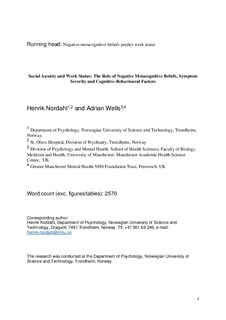| dc.contributor.author | Nordahl, Henrik | |
| dc.contributor.author | Wells, Adrian | |
| dc.date.accessioned | 2017-12-14T15:44:10Z | |
| dc.date.available | 2017-12-14T15:44:10Z | |
| dc.date.created | 2017-07-04T09:03:06Z | |
| dc.date.issued | 2017 | |
| dc.identifier.citation | Journal of Mental Health. 2017. | nb_NO |
| dc.identifier.issn | 0963-8237 | |
| dc.identifier.uri | http://hdl.handle.net/11250/2471986 | |
| dc.description.abstract | Background: Psychological health has a profound effect on personal and occupational functioning with Social Anxiety Symptoms in particular having a major effect on ability to work. Recent initiatives have focused on treating psychological illness with cognitive-behavioural models with a view to increasing return to work. However, the psychological correlates of work status amongst individuals with elevated mental health symptoms such as social anxiety are under-explored.
Aims: This study reports a test of unique predictors of work status drawing on variables that have been given centre stage in cognitive-behavioural models and in the metacognitive model of psychological disorder.
Methods: The sample consisted of high socially anxious individuals who reported to be working (n = 102) or receiving disability benefits (n = 102).
Results: A comparison of these groups showed that those out of work and receiving benefits had greater symptom severity, higher avoidance and use of safety behaviours, greater self-consciousness, and elevated negative metacognitive beliefs and beliefs about the need to control thoughts. However, when the covariance’s between these variables were controlled, only negative metacognitive beliefs significantly predicted out-of-work status.
Conclusions: Our finding might be important because CBT does not focus on metacognitive beliefs, but targets components that in our analysis had no unique predictive value for work status. | nb_NO |
| dc.language.iso | eng | nb_NO |
| dc.publisher | Taylor & Francis | nb_NO |
| dc.title | Social anxiety and work status: the role of negative metacognitive beliefs, symptom severity and cognitive-behavioural factors | nb_NO |
| dc.type | Journal article | nb_NO |
| dc.type | Peer reviewed | nb_NO |
| dc.description.version | acceptedVersion | nb_NO |
| dc.source.journal | Journal of Mental Health | nb_NO |
| dc.identifier.doi | 10.1080/09638237.2017.1340622 | |
| dc.identifier.cristin | 1480637 | |
| dc.description.localcode | 2017 Informa UK Limited, trading as Taylor & Francis Group. This is an Accepted Manuscript of the article, locked until 24 June 2018 due to copyright restrictions. The published version is available online: http://www.tandfonline.com/10.1080/09638237.2017.1340622. | nb_NO |
| cristin.unitcode | 194,67,40,0 | |
| cristin.unitname | Institutt for psykologi | |
| cristin.ispublished | true | |
| cristin.fulltext | original | |
| cristin.fulltext | postprint | |
| cristin.qualitycode | 1 | |
